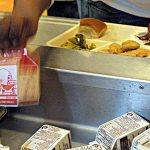
The dairy major’s presence in private label is helping offset branded pressure.
Saputo has indicated the pricing cycle linked to inflation is coming to an end but the international dairy major is still seeing some “softness” in the category.
While Saputo said volumes across the group were “stable” in the second quarter and were higher in its domestic Canadian market, export volumes remained under pressure, particularly in Europe from stretched consumer budgets.
However, Saputo’s presence in private label has been supportive on volumes as the company begins to shift focus from pricing to margin recovery but volumes overall are still below management’s expectations.
“In some markets and categories, consumers are feeling cost pressure and have shifted towards discount channels and private label,” chairman, president and CEO Lino Saputo told analysts as he presented second-quarter results.
“Notwithstanding the consumer inflationary environment and the broader market experiencing some levels of trade down, our brands performed well and we grew volume in key private-label channels.”
Mr Saputo added that volumes in Europe are taking longer than anticipated to recover in light of the cost pressures on shoppers and for the rest of the 2024 fiscal year expects the “volatile consumer and market dynamics to continue”.
Group revenue for the quarter to 30 September fell 3.1% to C$4.32bn ($3.13bn) from a year earlier but were up 5% in Canada at C$1.25bn. Revenues in Europe also rose, climbing 9.3% to C$246m.
The US saw a 5.3% downturn to C$1.95bn while other international segment revenue dropped 11.1% to C$879m.
“A decrease in certain markets selling prices also resulted in an inventory write-down of C$7m” in Saputo’s international division, which was “partially offset by the carryover effect of pricing action in our domestic markets, previously undertaken to mitigate increasing input costs and higher milk intake”.
Leanne Cutts, Saputo president and COO for international and Europe, said “macroeconomic conditions in the UK have been difficult for the consumer”, as she referred to double-digit grocery inflation still plaguing the country.
Consumer confidence in the UK “continues to be quite fragile”, Cutts added, although Saputo will have “significant private label coming on stream” in the fourth quarter, she said.
Elsewhere in the results, adjusted EBITDA rose 7.9% to C$398m and net earnings increased 7.5% to C$156m. Adjusted EPS came in at 37 Canadian cents on a diluted basis versus 35 cents a year earlier.
Mr Saputo described the challenges faced by global dairy farmers as the cost of production lowers milk output.
“The economics for the dairy farmers right now are very, very tough, and then compounded with that you’ve got a high interest [rate] environment. So we don’t see production off the farm level increasing dramatically in any way shape or form at least for the next six, nine, possibly even 12 months.”
He added: “At the same time, demand has been soft. I think we hit the bottom and we’re starting to see some buyers come back to the market and starting to contemplate long-term supply of goods.
“Those are all very, very good signs but the overall markets are still, from a pricing perspective, softer than the historical levels. And that’s what we’re contending with, both on the cheese side as well as on the ingredients side.”
The CEO also made a commitment to Australia after announcing last week a review, and potential closure, of Saputo’s King Island Dairy cheese factory in Tasmania. The company had already shuttered its Maffra site in Victoria and is in the process of selling – subject to a competition review – a pair of facilities in Laverton North, Victoria, and Erskine Park, New South Wales, to retailer Coles.
“Once our optimisation agenda is completed, we will have reduced our footprint from 11 to six facilities” in Australia, Mr Saputo said.
Just Food has asked Saputo to clarify the maths in terms of the number of Australia plants, as the figures would suggest another potential closure.
“We have a solid long-term vision for Australia and its business,” Mr Saputo told analysts last week on the results call. “Taking these necessary actions will help us refocus its core business, improve its operating cost structure, and provide a solid foundation for success.”


















